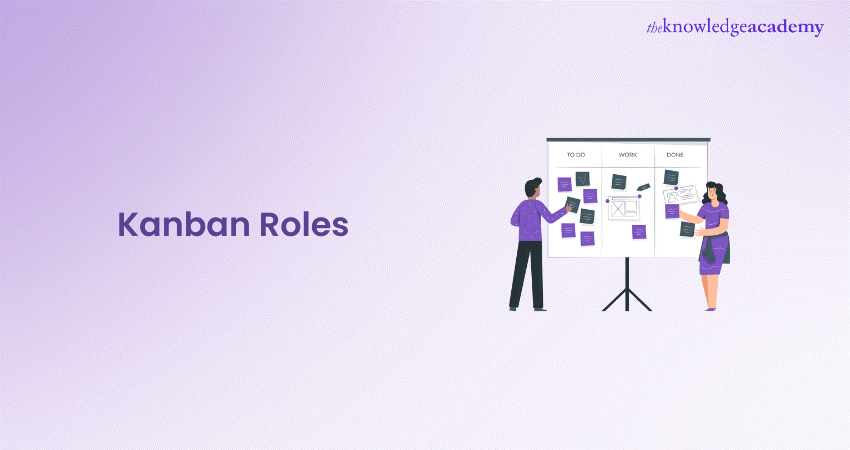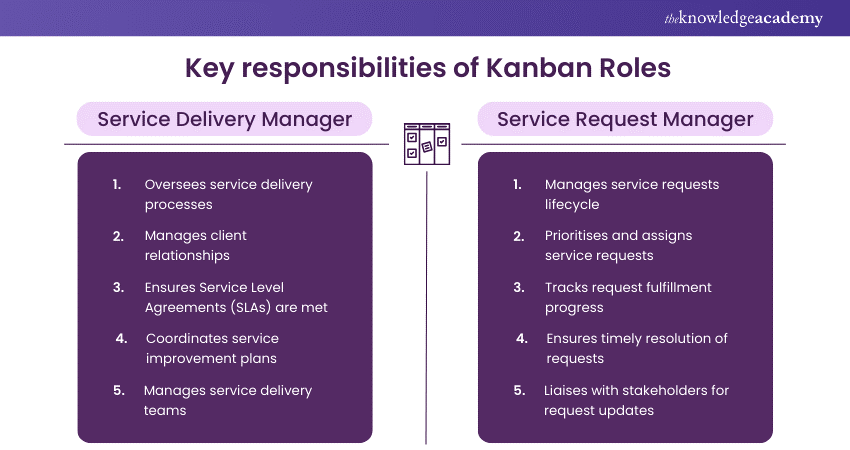We may not have the course you’re looking for. If you enquire or give us a call on +357 26030221 and speak to our training experts, we may still be able to help with your training requirements.
Training Outcomes Within Your Budget!
We ensure quality, budget-alignment, and timely delivery by our expert instructors.

In Agile practices, Kanban is linked with visualising workflows and fostering constant improvement. The designated Kanban Roles are at the approach's core, and each is essential for organising tasks and teamwork.
The roles include the Product Owner, who sets the tasks in line with the company’s objectives; the Team, assigned to do the tasks effectively; and the Kanban Master, who oversees facilitating the Kanban implementation and dealing with any impediments.
This opening prepares the audience to comprehend how these roles are intertwined to structure the workflow that meets the organisation’s objectives within the Kanban system. Read this blog more to learn about Kanban Roles.
Table of Contents
1) What is Kanban?
2) Key responsibilities of Kanban Roles
a) Service Delivery Manager (SDM)
b) Service Request Manager (SRM)
3) Conclusion
What is Kanban?
In Agile practices, Kanban is linked with visualising workflows and fostering constant improvement. The designated Kanban Roles are at the approach's core, and each is essential for organising tasks and teamwork.
The roles include the Product Owner, who sets the tasks in line with the company’s objectives; the Team, assigned to do the tasks effectively; and the Kanban Master, who oversees facilitating the Kanban implementation and dealing with any impediments.
This opening prepares the audience to comprehend how these roles are intertwined to structure the workflow that meets the organisation’s objectives within the Kanban system.
Learn how to use Kanban Board with the Kanban Practitioner Certification– join today!
Key responsibilities of Kanban Roles
Here, we will delve into two pivotal Kanban Roles within the Kanban framework:

Service Delivery Manager (SDM)
Service Delivery Managers (SDMs) often lead the Kanban world. They are responsible for service delivery across its whole life cycle, whether such services are produced to meet the customer's or stakeholders' needs. This position requires knowledge of customers' needs and the inherent complexities in the service delivery process.
The SDM's main job is to ensure that all the services rendered correspond with the customers' expectations from the feedback survey. Hence, stakeholders must participate in gathering their requirements, determining service level agreements, and, finally, developing Key Performance Indicators (KPIs) to monitor service quality and performance.
In addition to responding to customers' expectations, the SDM also performs an essential job of achieving the optimum of the service-provided delivery system. The SDM applies concepts like visualising the workflow, limiting work in progress, and continuous process improvements, which will reduce lead time, maximise workflow rates, and strive to increase efficiency.
Besides, the SDM also acts as a DOL, which means they must ensure the service delivery team has all the needed resources and help from the superior. We will also wholeheartedly remove obstacles, supply proper coaching and mentorship, and cultivate a culture of unity and teamwork.
The Service Delivery Manager holds the fort between the customer and the service delivery team, promoting client satisfaction, ensuring process excellence, and enabling the delivery of services that meet and even exceed client expectations.
Learn Kanban Methodologies, Process, Principles, Framework with our Certified Kanban Foundation and Practitioner Training! - join now!
Service Request Manager (SRM)
The Service Request Manager (SRM) is one of the key figures who should ensure the timely processing of incoming requests, prioritise work, and coordinate the distribution of resources within his service delivery team. This role is crucial in guaranteeing that customer concerns are timely, effectively addressed, and in line with the service level agreements.
SRM engagement starts with the service request backlog management, which is at the core of the SRM role. Such triaging involves prioritising urgent inbound communication, assessing its priority and impact, and determining the necessary approach. The SRM team creates a well-organised backlog, which allows for the efficiency of the delivery team as they stay focused on the customers' value and manage their workload effectively.
In addition, the SRM partners with stakeholders to collect requirements, ensure realistic needs, and report work done per specific requests. Such jobs cultivate superior communication and interpersonal skills alongside the innate ability to represent different stakeholders and balance different objectives.
Furthermore, the SRM professional is the leading actor in processing the service request work volume. However, by analysing indicators such as lead time, cycle time, and throughput, the SRM team can point out gaps and inefficiencies and propose improvements. Measures will be addressed with the staff accordingly to improve performance and production.
In short, the Service Request Manager plays a decisive role in the Kanban framework, facilitating the proper operation of client requests, adequate resource allocation, and a coherent relationship between service delivery and customer expectations.
Unlock the power of streamlined workflow management with our Certified Kanban Foundation Training!
Conclusion
Kanban Roles are crucial to helping organisations implement the Kanban methodology effectively. The SDM and the SRM are the key roles that ensure consistency of work, on-time service delivery, and process optimisations.
Elevate your Project Management skills with our Kanban Training- sign up now!
Frequently Asked Questions

The five elements of Kanban are:
1) Visualises workflow,
2) Limit work in progress (WIP),
3) Manage flow,
4) Make process policies explicit,
5) Improve collaboratively (using feedback loops).

Kanban may not be suitable for projects requiring precise planning and strict deadlines. It's less effective for projects with highly variable tasks or complex dependencies.

The Knowledge Academy takes global learning to new heights, offering over 30,000 online courses across 490+ locations in 220 countries. This expansive reach ensures accessibility and convenience for learners worldwide.
Alongside our diverse Online Course Catalogue, encompassing 17 major categories, we go the extra mile by providing a plethora of free educational Online Resources like News updates, Blogs, videos, webinars, and interview questions. Tailoring learning experiences further, professionals can maximise value with customisable Course Bundles of TKA.

The Knowledge Academy’s Knowledge Pass, a prepaid voucher, adds another layer of flexibility, allowing course bookings over a 12-month period. Join us on a journey where education knows no bounds.

The Knowledge Academy offers various Kanban Training, including the Certified Kanban Foundation and Practitioner Training, Certified Kanban Foundation Training, Certified Kanban Practitioner Training. These courses cater to different skill levels, providing comprehensive insights into Kanban Software.
Our Business Improvement Blogs cover a range of topics related to Kanban, offering valuable resources, best practices, and industry insights. Whether you are a beginner or looking to advance your Manufacturing Efficiency skills, The Knowledge Academy's diverse courses and informative blogs have got you covered.
Upcoming Business Improvement Resources Batches & Dates
Date
 Certified Kanban Foundation Training
Certified Kanban Foundation Training
Mon 6th Jan 2025
Mon 7th Apr 2025
Mon 4th Aug 2025
Mon 3rd Nov 2025







 Top Rated Course
Top Rated Course



 If you wish to make any changes to your course, please
If you wish to make any changes to your course, please


